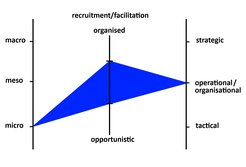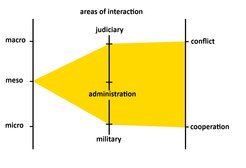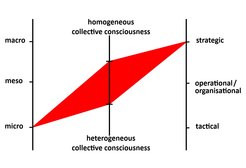Completed Projects of the Research Group
Projektrahmen | Aktuelle Projekte | Abgeschlossene Projekte | Publikationen | Aktuelles | Veranstaltungen
Projects within the Research Group focus on different aspects of terrorist organisations’ learning and cover different levels of the framework-dimensions accordingly. Find below short descriptions as well as illustrations delineating the scope of the hitherto completed research projects.
The Making of 'Foreign Fighters'

'Foreign fighters' have become crucial to the survival and development of violent Islamist groups/organisations in the current dynamic environment. This can be seen from the exponential upsurge in the number of foreign individuals who have joined various Islamist militant entities in Syria and Iraq since 2013. This research project focused on what makes individuals join violent Islamist groups (motivating factors) and how they get enlisted in those groups (facilitation or recruitment methods). Theoretically, this touches upon the micro (individual) and meso (group/organisational) levels of analysis. The micro level is connected to, or re-enforced and in some cases developed by, the meso level which is about operational and tactical methods of a) recruitment to or b) facilitation in joining a group/organisation. The project aimed to explore 'foreign fighters'' cases from Central Asia and Western Europe. more
Lost in Fighting? Dynamics of Interaction between Armed Opposition Groups in Syria (2012 – 2017)

This project analysed how armed opposition groups in multiparty civil wars draw the line between ally and enemy among their own kind. In Syria allies are defined by a specific subset of groups that fight on the same side of the war, that is majority Arab, Sunni factions. Three consequential ruptures in the insurgent arena constituted this set of actors: first, the split among the Kurdish-majority groups with their agenda of separatism and the other insurgents. Second, the complicated divorce between the so-called Islamic state and the more hardline Islamist groups such as Harakat Ahrar al-Sham al-Islamiyya and Jabhat al-Nusra (JN), and most recently (in 2017) the completion of the distinction between a 'mainstream' rebel camp and Hayat Tahrir al-Sham, the successor of al-Qaeda's Syria affiliate Jabhat al-Nusra. Hence, the focus was set on groups ranging from the latter to independent Islamist and Salafist groups to local battalions using the FSA-label. The project traced how these three ruptures constituted the set of actors fighting on the same side and why particularly the last one has been delayed so much and was plagued by so many difficulties. more
Between Gun and Olive Branch: Collective Consciousness and Strategy Change in Palestinian Nationalist Organisations

This research project addressed the decisions of nationalist organisations in Palestine regarding the strategies they employ in their efforts to create a Palestinian state and particularly aimed to understand the motivation and rationale underlying a groups' decision to choose a certain strategy. It was argued that the collective consciousness of an organisation, meaning the values and beliefs that its members share, plays a crucial role in this context: The collective consciousness is the lens through which the environment is analysed and the fundament on which a decision is based.
By discovering the respective collective consciousness of the Islamic Resistance Movement (Hamas), the Palestinian Liberation Movement (Fatah), and the Popular Front for the Liberation of Palestine (PFLP) and by analysing their strategic histories, the above mentioned ideas were put to the test. Of particular interest was to find out why or why not organisations changed their strategies and how change or continuity is related to an organisation's collective consciousness. It was assumed that differences between the groups vis-à-vis their strategies can be traced back to the characteristics of their particular collective consciousness.


